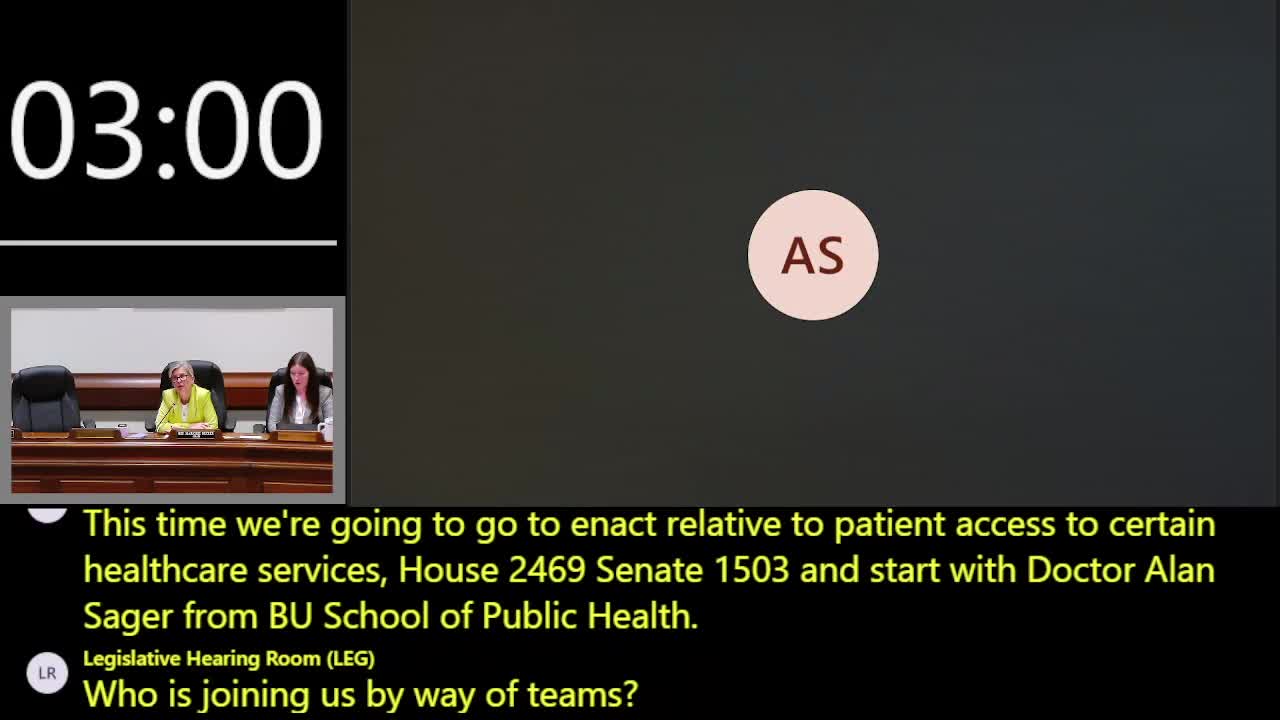Health professionals and officials push bills to preserve hospital services and rein in costs
September 29, 2025 | 2025 Legislature MA, Massachusetts
This article was created by AI summarizing key points discussed. AI makes mistakes, so for full details and context, please refer to the video of the full meeting. Please report any errors so we can fix them. Report an error »

Witnesses representing clinicians, hospitals, municipalities and employer groups told the Joint Committee on Public Health that recent hospital service closures and a wave of financial distress require new state tools to preserve local access to care.
Katie Murphy, president of the Massachusetts Nurses Association, told the panel that “the loss of essential services in communities across the Commonwealth is a crisis,” citing recent bankruptcies and abrupt closures that removed maternity, pediatric and behavioral health capacity from some communities.
Speakers described multiple bills. Two sets of bills — H2460/S1503 and H2534/S1574 — would require earlier notice of planned service discontinuations, mandate community input, prohibit certain expansions after service loss, and give the attorney general an oversight role. Another proposal (H2461) would establish metrics and accountability for hospital efficiency, focusing on avoidable services, revenue per unit, and expense management.
Alan Sager, a public health scholar, testified that Massachusetts once had 141 hospitals for 5 million residents (in 1960) and now has about 60 for 7 million, and that hospitals were paid over $45 billion last year; he said 37 of 61 hospitals reported negative operating margins. Eileen MacKenzie of the Employer Coalition on Health said high hospital prices push employer premiums and hurt job growth; she recommended metrics to measure hospital efficiency.
Community witnesses gave local examples. Audra Sprague, a registered nurse who worked 17 years at Nashoba Valley Medical Center, described the hospital’s sudden August 2024 closure and the resulting longer transports, crowded ERs, and loss of specialty services for nine towns and 115,000 residents. Jo Ann Fergus and other public health nurses said closures worsened health inequities and that Steward Healthcare’s bankruptcy and closures removed multiple local beds and service lines.
Local legislators asked for a formal working group to coordinate state, municipal and prospective provider planning. Representative John Rogers and Senator Mike Rush described Norwood Hospital’s five‑year outage after a major flood and urged a structured process so stakeholders can plan for a provider transition when a license or service is at risk.
Supporters urged receivership provisions and an ability for the state to require a hospital to demonstrate active efforts to maintain services rather than permit immediate license expiration without remedies. Witnesses also supported a law requiring at least one registered nurse on a hospital governing body (S1572) to bring clinical voice to governance.
The committee took testimony and did not vote. Witnesses asked members to report the bills favorably and to work with agency staff on technical details for notice timelines, community engagement standards, receivership triggers and hospital efficiency metrics.
Katie Murphy, president of the Massachusetts Nurses Association, told the panel that “the loss of essential services in communities across the Commonwealth is a crisis,” citing recent bankruptcies and abrupt closures that removed maternity, pediatric and behavioral health capacity from some communities.
Speakers described multiple bills. Two sets of bills — H2460/S1503 and H2534/S1574 — would require earlier notice of planned service discontinuations, mandate community input, prohibit certain expansions after service loss, and give the attorney general an oversight role. Another proposal (H2461) would establish metrics and accountability for hospital efficiency, focusing on avoidable services, revenue per unit, and expense management.
Alan Sager, a public health scholar, testified that Massachusetts once had 141 hospitals for 5 million residents (in 1960) and now has about 60 for 7 million, and that hospitals were paid over $45 billion last year; he said 37 of 61 hospitals reported negative operating margins. Eileen MacKenzie of the Employer Coalition on Health said high hospital prices push employer premiums and hurt job growth; she recommended metrics to measure hospital efficiency.
Community witnesses gave local examples. Audra Sprague, a registered nurse who worked 17 years at Nashoba Valley Medical Center, described the hospital’s sudden August 2024 closure and the resulting longer transports, crowded ERs, and loss of specialty services for nine towns and 115,000 residents. Jo Ann Fergus and other public health nurses said closures worsened health inequities and that Steward Healthcare’s bankruptcy and closures removed multiple local beds and service lines.
Local legislators asked for a formal working group to coordinate state, municipal and prospective provider planning. Representative John Rogers and Senator Mike Rush described Norwood Hospital’s five‑year outage after a major flood and urged a structured process so stakeholders can plan for a provider transition when a license or service is at risk.
Supporters urged receivership provisions and an ability for the state to require a hospital to demonstrate active efforts to maintain services rather than permit immediate license expiration without remedies. Witnesses also supported a law requiring at least one registered nurse on a hospital governing body (S1572) to bring clinical voice to governance.
The committee took testimony and did not vote. Witnesses asked members to report the bills favorably and to work with agency staff on technical details for notice timelines, community engagement standards, receivership triggers and hospital efficiency metrics.
View full meeting
This article is based on a recent meeting—watch the full video and explore the complete transcript for deeper insights into the discussion.
View full meeting
